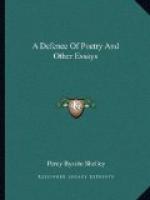The drama being that form under which a greater number of modes of expression of poetry are susceptible of being combined than any other, the connexion of poetry and social good is more observable in the drama than in whatever other form. And it is indisputable that the highest perfection of human society has ever corresponded with the highest dramatic excellence; and that the corruption or the extinction of the drama in a nation where it has once flourished, is a mark of a corruption of manners and an extinction of the energies which sustain the soul of social life. But, as Machiavelli says of political institutions, that life may be preserved and renewed, if men should arise capable of bringing back the drama to its principles. And this is true with respect to poetry in its most extended sense: all language, institution and form, require not only to be produced but to be sustained: the office and character of a poet participates in the divine nature as regards providence, no less than as regards creation.
Civil war, the spoils of Asia, and the fatal predominance first of the Macedonian, and then of the Roman arms, were so many symbols of the extinction or suspension of the creative faculty in Greece. The bucolic writers, who found patronage under the lettered tyrants of Sicily and Egypt, were the latest representatives of its most glorious reign. Their poetry is intensely melodious, like the odour of the tuberose, it overcomes and sickens the spirit with excess of sweetness; whilst the poetry of the preceding age was as a meadow-gale of June, which mingles the fragrance all the flowers of the field, and adds a quickening and harmonizing spirit of its own, which endows the sense with a power of sustaining its extreme delight. The bucolic




